Just how fun watching squirrels is, it’s more fun to watch baby squirrels. And just like any other animal, they eat, play, fight and love which are intensely cute but when do baby squirrels leave the nest?
The Short Answer…
Baby squirrels leave the nest about 84 days equivalent to 12 weeks or 3 months.
When Do Baby Red Squirrels Leave The Nest?
The red squirrels usually leave the nest around the same time as the eastern gray squirrels above which is around 3 months. The only difference is in size and color. Red baby squirrels are reddish and brown with a black stripe on the nose. In terms of size, they are smaller and so the red baby squirrels are. At 3 months old, they can make all the sounds an adult squirrel can, here’s what, when and why do squirrels make sounds?
The Complete Process
Gray squirrels typically mate from the end of February (late winter) up to May (Spring) and last until late summer. That results in breed from 36 to 44 days. That happens in the middle of the summer and late winter. They typically give out two to three babies at a time but can consist of up to 9 babies just like raccoons, here’s how and when do raccoons have babies.
Day 1
When baby squirrels come out, they neither have hair nor teeth, and eyes and ears closed but small little nails. They make a peeping noise and without fur but are black, brown, or gray in color. They are around 1 inch in size and around 20 grams. In this point, baby squirrel cannot poop or pee, and needs to be stimulated to do. Here’s what their poop looks like.
Here’s the squirrel growth chart.
Age | Characteristics |
Day 1 | Naked, Eyes Closed, Ears pinned Back |
Week 1 | Becomes Gray and Grows a Little fur |
Week 2 | Begin to open eyes a little, ears begin to unfold and nails begin to grow |
Week 3 | Lower front teeth appears, ears open, more fur |
Week 4 | White fur starts to appear on belly and legs, body and thicker fur coat |
Week 5 | Top teeth appears, tails become bushy |
Week 6 - 7 | Sit up, tail curling and full fur. Becomes naughty and plays more |
Week 7 - 8 | Teething, rapid motor development |
Week 8 - 10 | Looks like a adult squirrel except its smaller, start becoming independent |
Week 10 - 12 | Get Adult fur coats, starts playing on trees |
Week 12 - 14 | Full set of teeth, expand range and territorial behavior, Reaches 90% adult size and 80% adult weight |
2 Weeks
Each baby squirrels weigh around 28 Grams and one inch in size and no teeth, fur with the eyes and ears closed.
3 – 5 Weeks
In this stage, baby squirrels open her eyes and ears and grow up to 4 inches with a little tail like bears tail but with a little fur. They will start to raise teeth and is still very young.
6 Weeks
The little rodents are entirely filled with furs, and with sound and eyesight and smell determining. They are now ready to chew with the teeth developed and the tails curl. With those improved, they are now 7 to 8 inches long and can sit, stand and walk a little bit slowly.
8 Weeks
At this point, they have become strong enough and are now able to walk, run (Not very fast), climb a tree faster than bears that climb tree. Just like a 12 years old teenager, they are now naughty, playful, and pretty entertaining to watch.
They surf around, plays, climb, jump from ground higher than raccoons but not from height, here’s how high raccoons jump. And learns to find food and everything from her mother and her mama protects and is also conscious of the predators.
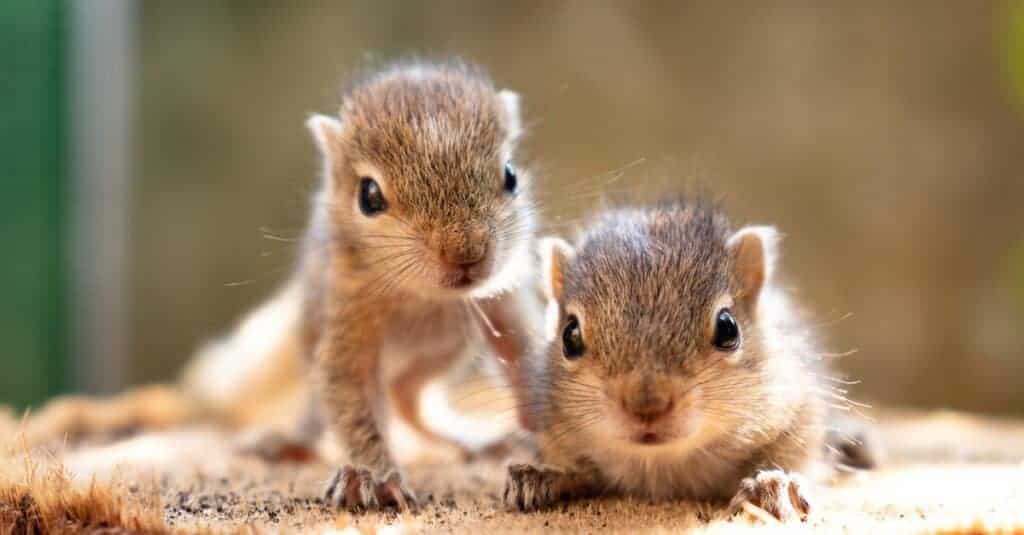
12 Weeks
With this age, they are now pretty much entirely raised and have learned the essential skills. Their nails, teeth, feet, tail, and eyes have finished raising and are quite sharp and fast. They are now able to climb, dig, run and travel as far as an adult squirrel. If you see a squirrel at this point with an adult squirrel, you can’t really differentiate them. In this period, these baby squirrels will leave the nest and can survive on their own without the need of her mother.
After they’re even out, they won’t be completely separated. Their mother will keep an eye on and maybe feed sometimes.
The fun fact is, their teeth never stop growing and that’s why they need to chew to keep them short, and they chew whatever comes first.
In this point, they have tasty meat and you can also hunt and eat them legally in your backyard. However, if you’re planning to get rid of them, it’s not a bad time as they have now grown up. Here’s how to get rid of the squirrels from your backyard.
How Many Babies Do Squirrels Have?
Most squirrels give birth to two to four babies in a litter with an average of two babies a year. Baby squirrels are born blind and deaf and weigh only about one ounce. They depend on their mother for warmth and protection. After about six weeks, they are able to see, hear, and eat solid food.
Here’s what do squirrels like to eat the most.
At 12 weeks old, they are ready to leave their mother and live on their own.
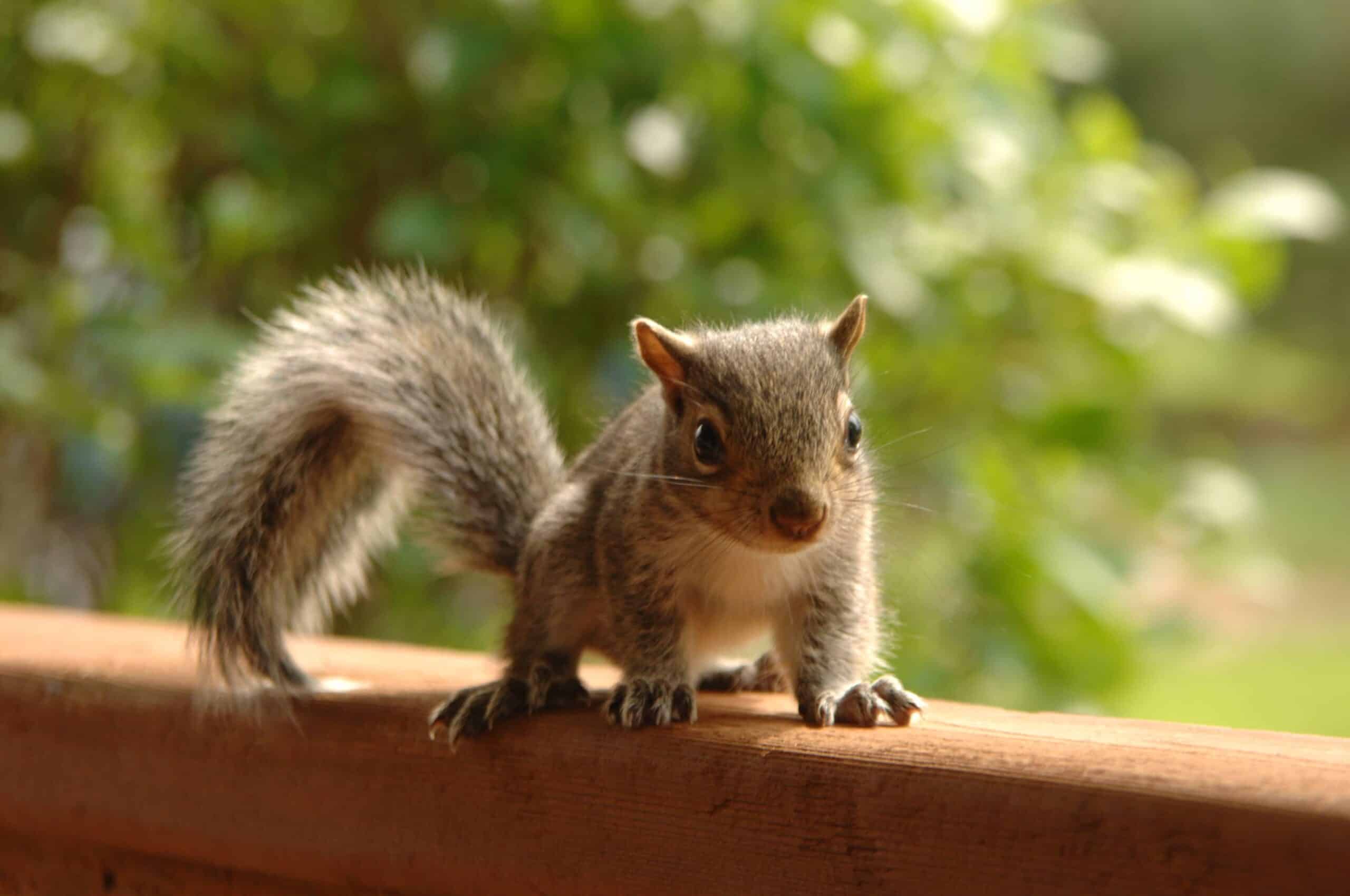
Do Squirrels Come Back To The Same Nest After They Leave The Nest?
At 12 weeks, baby squirrels will leave the nest and never come back to the nest again. Instead, they’ll build their own nests and raise their own families.
How Can You Tell How Old A Baby Squirrel Is?
You can tell a baby squirrel’s age by the size, eyes, ears, and color of the baby squirrel’s fur
A newborn squirrel will be pink and without fur while an older squirrel has fur.
If the eyes are closed and ears are plane, it is probably around 3 to 4 weeks old. This is also when baby squirrel start to grow fur.
And if the eyes and ears are open with lots of furs either sitting or sleeping (Do they sleep eyes open), he is 5 weeks old.
Fully covered with fur, if the squirrel is sitting, running (how fast can squirrels run), or foraging with long tail, it shows squirrel is 6 to 7 weeks old.
Lastly, looking same like adult squirrels but a bit smaller is baby squirrel 8 to 10 weeks according to Animals mom. It is when baby squirrels mature.
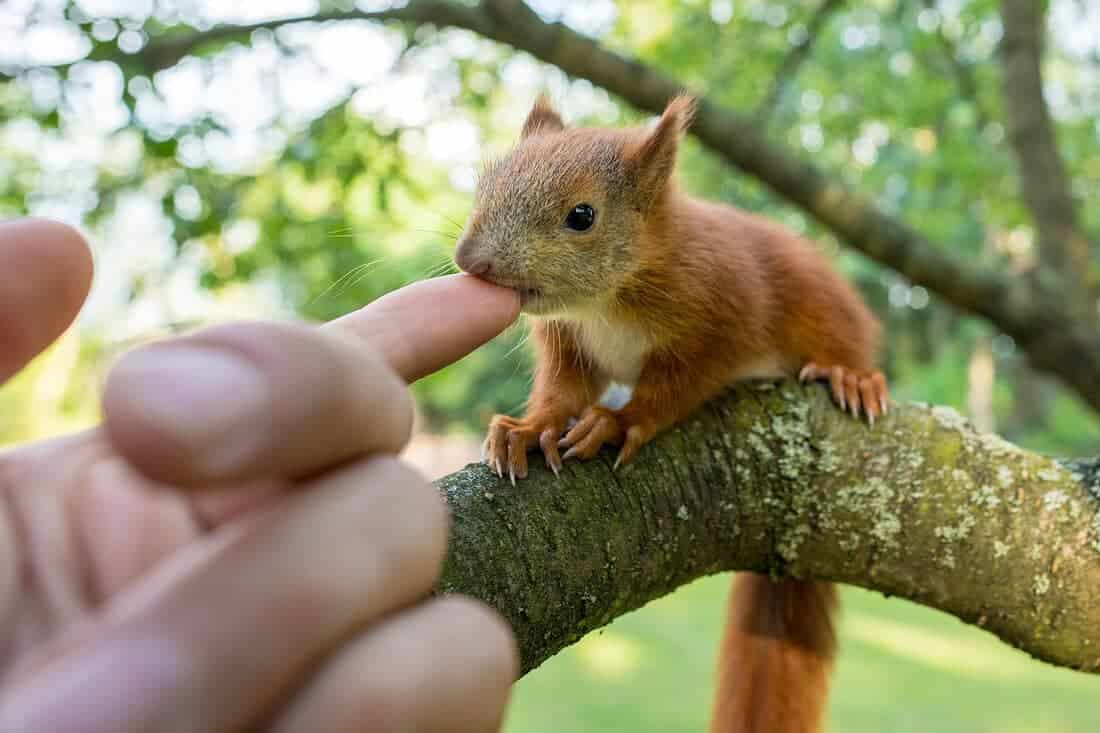
How Many Squirrels Live In A Nest?
On average, six squirrels live in a nest. Squirrels are generally very social creatures, so it’s not surprising that they live in such close quarters. If you find a squirrel nest, it’s best to leave it alone. The squirrels will eventually move on, and disturbing their nest can put them at risk. If you’re really curious, you can try observing the nest from a distance to see how many squirrels come and go.
Can You Help or Raise Orphan Baby Squirrel?
Similar to birds, baby squirrels are born and raised in the nest, but that doesn’t happen always. Sometimes, baby squirrels are left by their mother and are orphaned which mostly grey squirrels do. In this case, if you find a baby squirrel out of their nest, you may put them back into their nest.
If you didn’t find the nest, you may try to find the mother and put them onto the branch of the tree from where they’ve fallen which makes more chances of the squirrels to find them by her mother. This is probably the best and most helpful thing you’ve ever done to those lost babies.
Nourishing a baby squirrel can be done in the best way by her mother, not by anyone else. So if you find one, try your best to make her findable by her mother which is fairly easy. And also their mother is often around when the babies are lost.
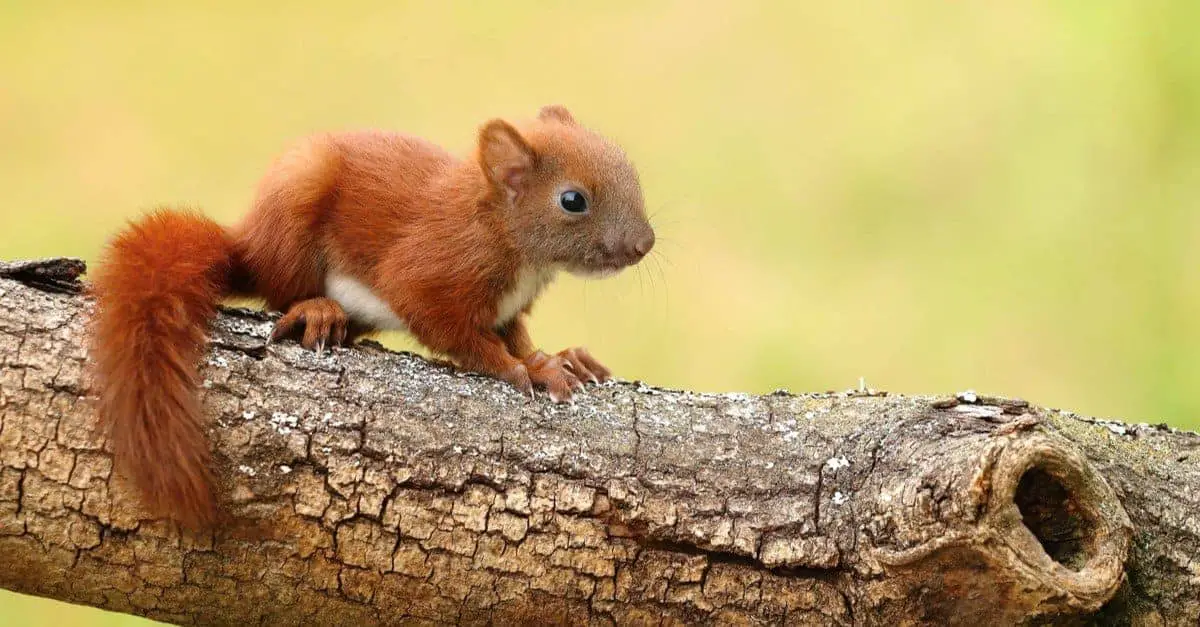
Can You Help Baby Squirrel or Her Mother?
If you see baby squirrels in the nest, you can’t really help them. Don’t move the nest or baby squirrels or it will make her mother think you’re a predator and she will move them into a worse place in an emergency and will mess up everything.
Once I did it took one of the baby squirrels out there due to cold and put them in home and when she return and didn’t saw the babies there. She was crazy and got all the other baby squirrels into a trash bin (which I later found out) and was searching for the lost one.
If there’s cold outside or up there, you may put some soft clothes around to warm up the nest. In case of rain, wind, you may place something above and around so it would be safe and warm.
If there’s some predator, that can be your dog or cat, you may, unfortunately, have the displace them into a safer place. Otherwise, don’t make a tiny change from inside or they will suspect some predators and will move to another place.
You can help feed her mother with nuts, fruits, acrons. Simply place some of those food into a bowl or squirrel feeder and as well as some water into a bowl from where they can get water and put it near the nest. It will definitely help.
However, you may not trap and release the squirrels right after the baby squirrel has just grown up especially not in winter. If you plan to do this, you may better wait for two or three weeks, to let them completely prepare and be on their own.
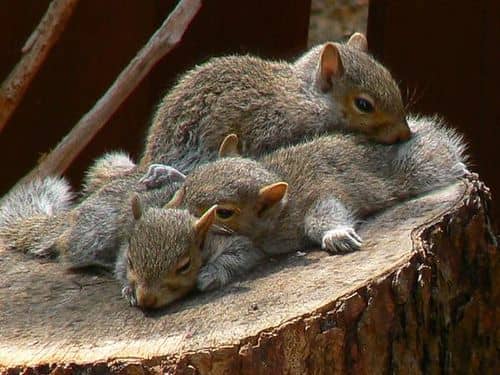
Summary
Baby squirrels are born completely without the sense of hearing, tasting, smelling, chew, and with no nails, fur, and little nail. They’re very small and grey or black.
In week two, they start to grow a little bit and gain weight of around 28 Grams but no teeth, fur with the eyes and ears closed.
In the fourth week, they will open their eyes and also gain a little bit of fur and start growing teeth.
At the sixth week, you will see them with the fur completely covered, and can also see, smell and have a little bit of teeth to chew. They will be large not much, and can also walk some.
In the eighth week, baby squirrels are now a very young teen, and will be running, climbing, playing, chasing each other not for mating but for playing and learn finding food water, and protecting from predators.
With the twelve-week, they have now completely ready to go and have everything what a squirrel has and also their tail curls which means they’ve grown completely. They will leave the nest and live but not on their own completely. They will be near the mother for months and after that they will be independent

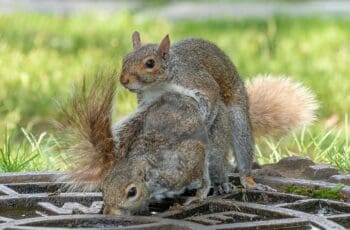

I’ve raised a baby squirrel it is now five weeks old can they hear sounds
I’ve raised a baby squirrel it is now five weeks old can they hear sounds
Kym dusek
Yes
Kym dusek
They can hear befor they see.
Lisa
How do I know how to make them go and find their own food. They want to just eat black seed They stay all day on the deck. I have 3 floors. I hate to see them hungry!! They bang on the glass to let us know they want food.